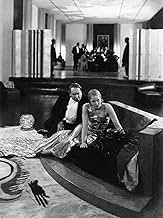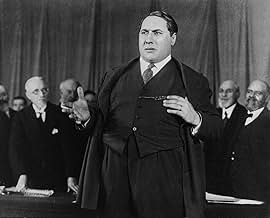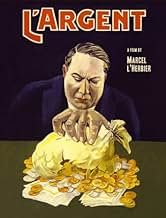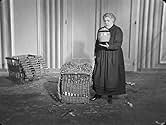L'argent
- 1928
- Tous publics
- 3h 15m
The business tycoon Nicolas Saccard is nearly ruined by his rival Gunderman, when he tries to raise capital for his company. To push up the price of his stock, Saccard plans a publicity stun... Read allThe business tycoon Nicolas Saccard is nearly ruined by his rival Gunderman, when he tries to raise capital for his company. To push up the price of his stock, Saccard plans a publicity stunt involving the aviator Jacques Hamelin flying across the Atlantic to Guyana and drilling ... Read allThe business tycoon Nicolas Saccard is nearly ruined by his rival Gunderman, when he tries to raise capital for his company. To push up the price of his stock, Saccard plans a publicity stunt involving the aviator Jacques Hamelin flying across the Atlantic to Guyana and drilling for oil there, much to the dismay of Hamelin's wife Line. While Hamelin is away, Saccard t... Read all
- Director
- Writers
- Stars
- Line Hamelin
- (as Mary Glory)
- Massias
- (as Al. Mihalesco)
- Daigremont
- (uncredited)
- Director
- Writers
- All cast & crew
- Production, box office & more at IMDbPro
Featured reviews
The plot, taken from a novel by Emile Zola, about stock market speculation, is as timely as ever. Saccard, an unscrupulous banker, tries to manipulate the French stock market through speculation. He is opposed by another banker, Gunderman, who advocates caution and stability. After a brief downturn in his fortunes, Saccard uses a Lindbergh like aviator to try and return to the top. He also has designs on the aviator's wife. It all plays out at a massive dinner party which is the movie's major set piece.
The performances of the three male leads (Pierre Alcovar as Saccard, Alfred Abel as Gunderman, and Henry Victor as the aviator) are very good while the two female leads (Brigitte Helm and Mary Glory) are less so. This has more to do with their roles being underwritten then anything that the actresses do as performers. Poor Brigiite Helm as Baroness Sandorf seems little more than a stylish clotheshorse. All she does is pose and pout as a spoiled aristocrat. Mary Glory as the aviator's wife has a more substantial role.
This brings me to the biggest issue that I have with L'ARGENT. While not denying the film's reputation in some circles, I found it to be visually overdirected in the manner of L'Herbier's contemporary Abel Gance or in the later movies of Orson Welles or Stanley Kubrick. Many critics praise the film's non-linear visual style with its constantly moving camerawork and quick cut editing which are in effect throughout the 150 minute running time. However I find that these cinematic tricks get in the way of rather than enhance the story.
I first saw L'ARGENT in the 2009 Eureka Region 2 edition which ran 165 minutes. Although that version was the best one available then, this new 2019 Flicker Alley Blu-Ray surpasses it. In addition to having a better picture and tighter running time, it comes with a choice of 2 different orchestral soundtracks. Like the Eureka release it also comes with the remarkable documentary THE MAKING OF L'ARGENT also done in 1929. While it left me cold, L'ARGENT is an important film and an absolute must for lovers of silent cinema...For more reviews visit The Capsule Critic.
A superb silent classic, exquisitely well made and all too infuriatingly relevant even decades later
All that's to say nothing of the many, many extras on hand, nor those fetching facets like costume design, hair, and makeup that tend to be overlooked. It's just as impressive that the feature manages to do all this with tale set in contemporary France, rather than a period piece or a work of fantasy or sci-fi; it's certainly more infrequent that cinematic storytelling of a more realistic nature is able to conjure such visual wizardry - but here we are. And then there's the plot: a vortex of greed, manipulation, corruption, deceit, and the destruction that follows in the wake of such iniquities, as infuriatingly relevant in 2023 as it was ninety-five years ago, or decades prior when Émile Zola's novel was written, or further back still when it was set. There are no surprises here, for wealth, power, and the pursuit or promise of either only ever bring out the worst in people; there are no singular lightning bolts of brilliance in the screenplay, as all the best creativity the film boasts is found in its craftsmanship. Nonetheless the story is absorbing and compelling, and ably keeps us engaged from start to finish, and as scenes are both written and directed we get no few moments that are especially potent. It helps that the cast is terrific across the board, with Pierre Alcover, Brigitte Helm, and Marie Glory particularly standing out not just for the amount of time they have on-screen, or their prominence in the story as we see it, but definitely too for the strength of their vibrant acting of range and nuance.
I don't think it's unfair to say that the building blocks of the movie kind of outshine the tale it imparts. This isn't to say that the writing is weak, but for as excellent as it may be, the title's construction is altogether extraordinary. Then again, I'm inclined to think that the plot is better about conveying major ideas rather than minute details, and also advances somewhat gradually given the length of over two and one-half hours - with a fair amount of story reserved for just the last twenty minutes. In fairness, should one read up on the history of 'L'argent' even the slightest bit it's clear that the version that now exists is not what L'Herbier originally envisioned, so one can reasonably assume that some elements were lost over time. In any event, however much one wishes to him and haw about This and That, by and large the fact remains that this is a superb, fabulously well made silent classic that continues to hold up all too well. What excitement it may not wholly, immediately foster with its narrative, it more than makes up for with the genius of the work behind the scenes, and the result all around is unquestionably grand. As a matter of personal preference some of its contemporaries may stand taller still, but one way or another 'L'argent' is fantastic, highly deserving of recognition and remembrance, and it earns a solid recommendation for anyone who appreciates older cinema.
Pierre Alcover who plays Saccard, the treacherous financier who falls for the hapless heroine whose pilot lover has conveniently flown to Equatorial Guinea to drill for oil, is quite good, but Brigitte Helm, the comely object of his affections is just awful. She's the kind of actress who would overact when pretending to be asleep, and when she is on the brink of suicide she wanders into Saccard's office and stumbles around as if wounded by a sniper's bullet. Saccard looks like the manipulative weasel that he is. He fancies himself as a Napoleon of the financial world but, like Napoleon, he bites off more than he can chew when he locks horns with the urbane Gundermann.
The film does have some saving graces. L'Herbier's use of the camera is sublime, and gives the bored viewer something to concentrate on when the sluggish pace gets too much. Perhaps that is why he chose to film as a silent – the use of sound, while making the story easier to convey, would have restrained the camera and robbed the film of what vitality it possesses. The film does a good job of illustrating the corrupting influence of money, only over-emphasising its message on the rare occasion. As the character's become more depraved and self-absorbed their surroundings become more opulent, their clothes more refined, and it is clear that they are becoming prisoners of their possessions. There's also a great last scene – but you have to wait an unrealistically long time to get to it.
Did you know
- TriviaThere are 1,952 shots in the film, with an average shot length of just six and a half seconds.
- Alternate versionsThe film was shown to the French press in December 1928 in a cut lasting about 3 hours and 20 minutes, however by the time the film had its first public screening in January 1929, producer Jean Sapene had ordered the length to be cut by half, unbeknownst to director Marcel L'Herbier and much to his and fellow filmmaker Marcel Carné's dismay. Much later, the film was restored to a running time of 2 hours and 25 minutes.
- ConnectionsFeatured in The Twentieth Century: The Movies Learn to Talk (1959)
Details
- Release date
- Country of origin
- Languages
- Also known as
- Jazz-Bank
- Filming locations
- La Bourse, Paris 2, Paris, France(interior: shots from the ceiling covering the crowd movement of buying and selling orders)
- Production companies
- See more company credits at IMDbPro
Box office
- Budget
- FRF 5,000,000 (estimated)
- Runtime
- 3h 15m(195 min)
- Color
- Sound mix
- Aspect ratio
- 1.33 : 1


































